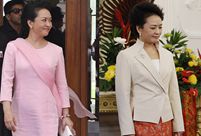 Close-up view of August Aerobatic Team
Close-up view of August Aerobatic Team
 Goddesses married in 2014
Goddesses married in 2014
 Polar region photos raise worldwide awareness of global warming
Polar region photos raise worldwide awareness of global warming
 Get off at the last stop — Beijing Subway in vision
Get off at the last stop — Beijing Subway in vision
 Top 100 beauties in the world!
Top 100 beauties in the world!
 Gallery: Who is the most beautiful one?
Gallery: Who is the most beautiful one?
 If you like autumn, put your hands in the air!
If you like autumn, put your hands in the air!
 Fan Bingbing's "Queen style" in new play
Fan Bingbing's "Queen style" in new play
 Lingerie show at 2014 Miss China
Lingerie show at 2014 Miss China
 J-10 fighters show aerobatic stunts in smog-free sky
J-10 fighters show aerobatic stunts in smog-free sky
MACAO, Dec. 8 -- China's central government has always been a strong support behind Macao's notable economic and social progress over the past 15 years, and will continue to back up Macao' s development, said Li Gang, director of the Liaison Office of the central government in Macao.
It was Macao people's adherence to the "One country, Two systems" policy, the efforts of the Macao Special Administrative Region (SAR) government and the central government's support that jointly facilitated the region's leapfrog development, said Li.
"Earth-shaking changes have taken place here over the past 15 years," said Li, recalling the scenes he witnessed when Macao celebrated its return to the motherland in December 1999.
The central government has paid much attention to Macao's development. While drafting the national socio-economic development program, the central government gave firm support for Macao to build a world tourism and leisure center and a platform for economic and trade cooperation with Portuguese-speaking countries, which Li said is a major move to help Macao readjust its economic structure and lessen its heavy dependence on the casino gaming.
"Only by diversifying the economy could Macao prevent from economic crisis," he said.
Guided by China's 12th five-year plan for socio-economic development in 2011-2015, the SAR government strengthened urban planning and protection of historic sites, and launched the Ministerial Conference of the Forum for Economic and Trade Cooperation between China and Portuguese-speaking Countries.
Boosted by the triennial event, among others, trade between China and Portuguese-speaking countries surged to 130 billion U.S. dollars in 2013 from 10 billion U.S. dollars about a dozen years ago.
"Macao has played an irreplaceable role in China's cooperation with these countries," he said.
To further boost development in Macao, the central government signed the Mainland and Macao Closer Economic Partnership Arrangement (CEPA) in October 2003, which has greatly promoted trade facilitation and boosted investment.
Under the CEPA, the value of Macao's zero-tariff exports to the mainland reached 530 million patacas (about 66.4 million U.S. dollars) by June this year.
"The 15 years of development in Macao also proved a great success for the 'One country, Two systems' policy," Li added.
The full implementation of the policy and Macao people's support for the Basic Law has guaranteed that Macao people govern Macao and the SAR enjoys a high degree of autonomy, he said.
In the future, the central government will continue to improve the systems and mechanisms related to the implementation of the Basic Law, ensure the region's high degree of autonomy and support the SAR chief executive and government in administration according to law, said Li.
"I believe that with the joint efforts of the central government and the SAR government, Macao will enjoy sustained prosperity and social harmony," said Li.
 20 years on: Relocated Three Gorges residents through lens
20 years on: Relocated Three Gorges residents through lens PLA HK Garrison veterans leave behind beautiful smiles
PLA HK Garrison veterans leave behind beautiful smiles Representative beauties of each province in China
Representative beauties of each province in China Chestnut girl goes viral online
Chestnut girl goes viral online Victoria's Secret Fashion Show
Victoria's Secret Fashion Show In photos: Bright and brave female soldier of PLA
In photos: Bright and brave female soldier of PLA China's charming first lady
China's charming first lady Excellent photos of Zhuhai Air Show
Excellent photos of Zhuhai Air Show China's heavyweight aircraft
China's heavyweight aircraft An old problem
An old problem Despite torture report, US escapes censure
Despite torture report, US escapes censure  Inflation hits five-year low
Inflation hits five-year low Runaway brides
Runaway bridesDay|Week|Month